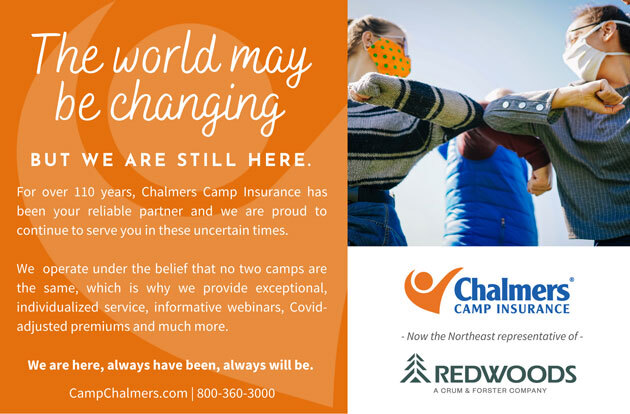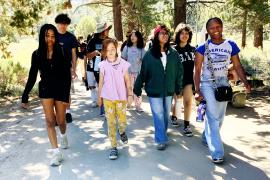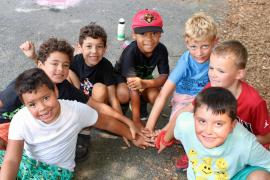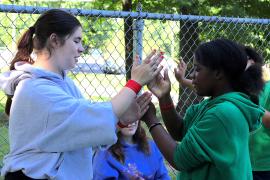Do you ever wonder if the little things you do for others really make a difference? Many years ago, something amazing happened when I returned to one of my old camps to do some staff training. After dinner, as I was sitting outside on a bench, a staff member walked up and asked, “Do you remember me?”
I looked at her, smiled, and said, “Give me a minute,” followed by, “May I have a hint?” Before I was caught in an obviously awkward moment, she explained that 12 years earlier she’d sat on that very same bench horribly homesick as a first-day, eight-year-old camper.
“Person after person walked by that day, and nobody seemed to notice the tears I was trying to hide,” she said. “Each minute seemed like an hour, and about the time I was ready to run away, you came up to me, smiled, and said, ‘Boy, do I miss my dog. Do you mind if I sit with you?’” She finished her story with a tear in her eye, explaining, “Because you were so kind that day, I decided I wanted to become a counselor, and I have not missed a summer for the past 12 years.”
What kindness she demonstrated by sharing that with me.
The importance of being kind is a common theme played out worldwide and in every camp across our country. Camp provides an amazing opportunity for staff to demonstrate random acts of kindness in all aspects of life, but the demands of busy schedules and hot summer days can have an adverse effect on kindness, putting some staff in danger of losing their ability to use compassion as a leadership tool.
At the beginning of camp, most of us are rested and can draw on our mental and emotional reserves to make kindness a priority. Both first-time and returning counselors work side by side in activity areas, cabins or groups, assemblies or the dining hall, and spirits are high. Behind the scenes our fellow staff — transportation, food service, maintenance, and administration — are also completing tasks with the understanding that their role is crucial to the camp’s success. We are all generally excited and eager to be helpful as everybody settles in for a fun-filled summer.
Then we hit a bump in the road. A camper demonstrates a bad attitude. A fellow counselor complains about your game choice. And you feel your anxiety rising as your energy level takes a nosedive. In those moments, the world may seem decidedly unkind. However, those moments actually present an opportunity to extend your capacity for showing compassion and understanding to yourself. Focus on positive actions you can take and show yourself some grace.
In addition to the immediate benefits of personal interactions, acts of kindness have a positive trickle-down effect on other staff. Research shows a moderately strong effect between people who witness altruism and then follow suit themselves (Jung, Seo, Han, Henderson, & Patall, 2020). In camp terms, that means when staff (you) model kind and helpful behavior, it has a healthy impact on spreading positive interactions throughout camp.
Prosocial, kindness-infused behaviors are contagious. When you act to the benefit of other people and those around you see the favorable outcomes from your actions, it creates a critical link to building a positive culture within your cabin or group.
What Does it Mean to Be Kind?
Showing acts of kindness may be as simple as taking the time to help someone finish props for the camp talent show or offering support to a camper who is struggling with a new skill.
These examples depict a selfless behavioral response of compassion and/or action from one person to another, a healthy mindset that includes the well-being of other staff as a priority for our daily interaction. Showing kindness requires a personal decision to put aside your own interests to help someone else, even if that requires extra effort on your part.
Caring increases a sense of happiness. When you do something kind, the person or group on the receiving end of your gesture feels gratitude. Camp life is challenging and living in a community can be stressful, but experiencing thankfulness can lead you back to feeling positive about your own situation. In short, kindness promotes an understanding that increases the level of benevolence and opens a dialog for quality communication.
Attributes like compassion, empathy, and humor should be used to help campers and other staff feel connected. When this happens, the impossible becomes possible. Staff break out of their comfort zones and become better leaders. Campers push themselves beyond perceived limits — and the barriers that once existed are redefined with hope of a new perspective.
Keep in mind that the process of giving or receiving an act of kindness can be a complex task. For example, sharing a candy bar that contains peanut traces with a camper who has a peanut allergy is kind but harmful. Being kind should not be treated as a standalone trait. It requires a show of support from other qualities, such as sensitivity, patience, and information gathering. Taking a moment to check a health form prior to sharing a potentially dangerous food item is a best practice that clearly shows you want to be supportive as well as friendly.
Self-Reflection
To have a fully formed capacity for being kind, you must first recognize your truth. Psychologist Karyn Hall, PhD, said, “When you are stressed by heat, fatigue, worries, hunger, illness, or whatever, it makes you irritable. Kindness is not about being sweet or nice. In fact, it includes telling the truth in a helpful way, which means being honest with yourself. That can make a huge difference, because if you can acknowledge your own stress, you are less likely to see others as responsible for how you feel, and less likely to blame outward” (Hall, 2020).
If you find, on a particular day, that you are lacking energy and need a break, speak up to your supervisor and ask for help. Kindness to yourself means being able to change your expectation of what you can do. Be honest and go at a slower pace or let someone else take the lead. Changing leadership roles is a good practice, and the experience of learning how to both lead and follow is a skill you will use repeatedly throughout your life.
Approach the summer with both short- and long-term compassion goals. Showing kindness effectively requires prosocial skills and an accurate assessment of your own abilities in that regard, which, in turn, calls for a combination of effort and desire. This is your short-term goal.
Relationships are complex, and successfully showing kindness to your campers will require practice — because you must figure out how to give your gifts of kindness in ways your campers will accept. Discovering what works best with each of your campers is a good long-term goal.
As a counselor, one of your most effective kindness tools is active listening. Paying attention to what people say and responding with caring and appropriate reactions is a sign of good leadership.
Here are some examples that demonstrate kindness in action:
- Be an active listener.
- Hold the door open for someone in a hurry.
- Give a compliment.
- Share in a chore that is not yours.
- Volunteer to help on a project or special event.
- Make someone a gift or card.
- Help clean up after a meal.
- Increase your awareness by intentionally acknowledging acts of kindness from others.
- Model appropriate opportunities to be kind to yourself.
- Smile a lot — especially when others are in need of support.
Immediate Benefits
What are the tangible benefits of doing all this work? Again, people who receive kindness feel gratitude, which makes them feel happy. In camp, happy campers have a higher motivation to participate in activities. They recognize and duplicate caring behaviors in each other. You may see evidence of this on hot days or during challenging activities when words of encouragement begin to replace disparaging or whiny comments. Remember to actively promote what skills you are trying to create and why you are putting effort toward that end. The mantra “happy campers equal happy memories” is not only true, but it has the added bonus of increasing desired behaviors through positive reflection.
Gratitude, or the quality of being thankful, also increases subjective happiness — because more attention is paid to acts of kindness than to behaviors classified as undesirable. Contentment or joy is often dependent on what campers are thinking. Positive thoughts increase the odds they will choose to be happy. If you take the time to celebrate individual and group successes, campers will feel satisfied with their contributions. And repeated appreciation for camper effort will be an affirmation of their desired behavior. Through your example, they will experientially learn positive relationship skills.
Cause and EffectTo illustrate the importance of people receiving kindness, try this fun exercise. Get out a sheet of paper and quickly write down all the acts of kindness you have done in the past 24 hours. Don’t worry about how big or small they are, just write. See if you can do it in 90 seconds. As you look at your list:
Even small actions can go a long way. If you multiply this opportunity by a summer, it is easy to see how important you are and how much positive influence you can have on your fellow staff and campers. |
Kindness Creates Strong Bonds
Practicing kindness is a great way to start a lifelong friendship with a camper or fellow counselor. Ask almost anyone who has spent time in camp, and they will gladly tell you the circumstances of how they met one of their friends. You will find that close bonds of friendship often began with a simple act of kindness from one stranger to another.
For those times this summer when weariness sets in, it may help to have a slogan that reminds you of the ongoing positive impact your kindness can have on campers and fellow staff. Try KIDS:
- Kindness
- Inspires
- Daily
- Strength
If you work on your personal actions/reactions daily, you can build the trust and reciprocal altruism that are trademarks of true friendships and strong mentor-mentee relationships.
Yes, having the ability to be kind throughout the summer is a challenging task — but the benefits of trying are many. Take the time each day to demonstrate how much you care by showing others your heart. Strive to be honest with yourself and ask for help when needed. Try different avenues to show kindness, and promote caring as a way of connecting. Never doubt the value in your ability to positively affect campers. Your kindness might just turn an eight-year-old, homesick camper into a future camp counselor and spreader of joy.
Greg Cronin, MPA, CCD, CPRP was a camp director for over 30 years and has been conducting staff trainings since the early 1980s. He is a nationally known conference speaker, consultant, staff trainer, author, former American Camp Association (ACA) National Board member, standards visitor, and corporate trainer with more than 200 clients nationwide. Greg has trained thousands of camp staff on youth development and leadership. He has appeared on TV, radio, and Capitol Hill as a spokesperson for the camp experience and is a frequent contributor to Camping Magazine. Greg is featured in ACA’s By the Expert book series with chapters on leadership and staff training. To book Greg for staff orientations, trainings, and workshops, please call 703-395-6661 or email [email protected].
References
Curry, L. R. (2019). A range of kindness activities boost happiness. The Journal of Social Psychology, 340–343.
Hall, K. (2020, January 17). Licensed Psychologist and Certified Clinician and Coach. (G. Cronin, Interviewer).
Jung, H., Seo, E., Han, E., Henderson, M. D., & Patall, E. A. (2020, August). Prosocial modeling: A meta-analytic review and synthesis. Psychological Bulletin, Vol 146(8).





